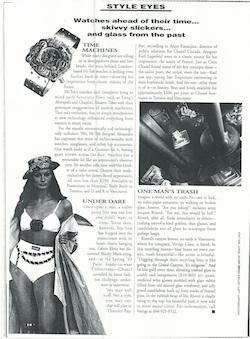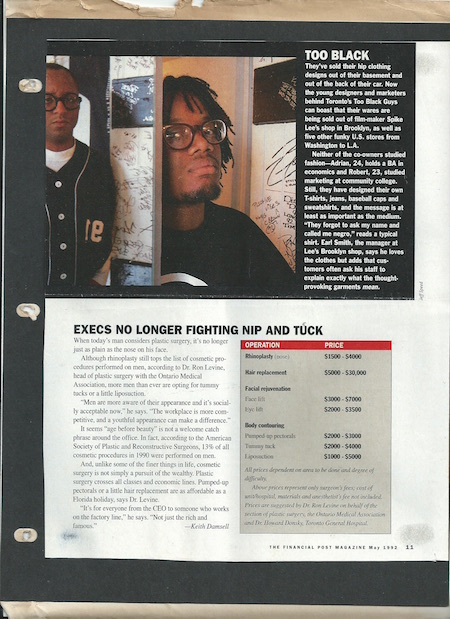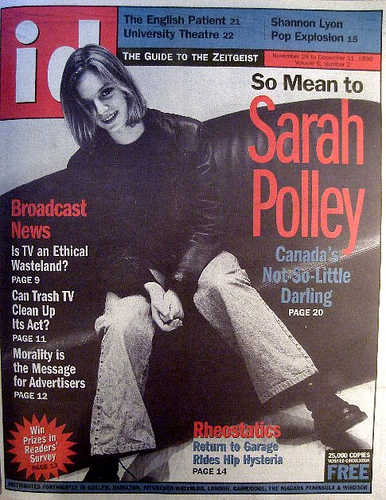Magazine Stories | Toronto 1992
 Sunday, January 31, 2016 at 1:11PM
Sunday, January 31, 2016 at 1:11PM
By David South
Flare Magazine (Toronto, Canada) 1992
Time Machines
While many designers are telling us to don platform shoes and love beads, the man behind London-based Hi-Tek watches is looking even further back in time - drawing his inspiration from classic visions of the future.
Hi-Tek’s stainless steel timepieces bring to mind early futuristic films such as Lang’s Metropolis and Chaplin’s Modern Times with their grotesque exaggerations of modern machinery. That era’s confusion, fear, or simple wonderment at new technology influenced everything from toasters to steam trains.
For the equally economically and technologically turbulent ‘90s, Hi-Tek designer Alexander has captured this sense of techno-wonder with watches, sunglasses, and other hip accessories. One watch looks as if a Cuisinart hit it, leaving gears strewn across the face. Another has a retractable lid like an astronomer’s observatory. Yet another tells time with the blinker of a radar screen. Despite their made-exclusively-for-James-Bond appearance, all cost less than $190. Available at Possessions in Montreal, Body Body in Toronto, and D and R in Vancouver.

By David South
The Financial Post Magazine (Toronto, Canada), May 1992
Too Black
They’ve sold their hip clothing designs out of their basement and out of the back of their car. Now the young designers and marketers behind Toronto’s Too Black Guys can boast that their wares are being sold out of film-maker Spike Lee’s shop in Brooklyn, as well as five other funky U.S. stores from Washington to L.A.
Neither of the co-owners studied fashion - Adrian, 24, holds a BA in economics and Robert, 23, studied marketing at community college. Still, they have designed their own T-shirts, jeans, baseball caps and sweatshirts, and the message is at least as important as the medium.
“They forgot to ask my name and called me negro,” reads a typical shirt. Earl Smith, the manager at Lee’s Brooklyn shop, says he loves the clothes but adds that customers often ask his staff to explain what the thought-provoking garments mean.

Other stories from the 1990s:
Aid Organization Gives Overseas Hungry Diet Food
Artists Fear Indifference From Megacity
The Big Dump: CP's New Operational Plan Leaves Critics with Questions Aplenty
Casino Calamity: One Gambling Guru Thinks The Province Is Going Too Far
Do TV Porn Channels Degrade and Humiliate?
The Ethics of Soup: Grading Supermarket Shelves - For Profit
False Data Makes Border Screening Corruptible
Freaky - The 70s Meant Something
Is the UK Rushing to Watch TV Porn?
Land of the Free, Home of the Bored
New Student Group Seeks 30 Percent Tuition Hike
Oasis Has Arrogance, A Pile of Attitude and the Best Album of 1994
Peaceniks Questioning Air-raid Strategy in Bosnia
Philippine Conference Tackles Asia's AIDS Crisis
Playboy ‘is not for sad and lonely single men’
Porn Again: More Ways to Get Off, But Should We Regulate the Sex Industry?
Somali Killings Reveal Ugly Side of Elite Regiment
Starting from Scratch: The Challenge of Transition
State of Decay: Haiti Turns to Free-market Economics and the UN to Save Itself
Study Says Jetliner Air Quality Poses Health Risks
Swing Shift: Sexual Liberation is Back in Style
Take Two Big Doses of Humanity and Call Me in the Morning
Taking Medicine to the People: Four Innovators In Community Health
Top Reporters Offer Military Media Handling Tips
Traffic Signs Bring Safety to the Streets
TV's Moral Guide in Question - Again
UK Laws on Satellite Porn Among Toughest in Europe
Undercurrents: A Cancellation at CBC TV Raises a Host of Issues for the Future
US Health Care Businesses Chasing Profits into Canada
Will the Megacity Mean Mega-privatization?
Will Niagara Falls Become the Northern Vegas?

This work is licensed under a
Creative Commons Attribution-Noncommercial-No Derivative Works 3.0 License.
 1992,
1992,  By David South,
By David South,  Canada,
Canada,  Now Magazine,
Now Magazine,  Scan Magazine,
Scan Magazine,  This Magazine,
This Magazine,  Toronto,
Toronto,  Watch Magazine,
Watch Magazine,  id magazine,
id magazine,  investigative journalism,
investigative journalism,  magazine stories,
magazine stories,  media in
media in  Austerity,
Austerity,  Canada,
Canada,  Cities,
Cities,  Digital,
Digital,  Health,
Health,  Magazine Stories 1990s,
Magazine Stories 1990s,  Media,
Media,  Now Magazine,
Now Magazine,  Sarah Polley,
Sarah Polley,  The Toronto Star,
The Toronto Star,  This Magazine,
This Magazine,  Today's Seniors,
Today's Seniors,  Toronto,
Toronto,  United Nations,
United Nations,  University of Toronto,
University of Toronto,  Youth
Youth 
